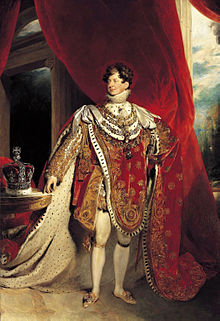
Back قلادة ملكية Arabic Kraljevska medalja BS Medalla de la Royal Society Catalan Royal Medal Danish Royal Medal German Medalla Real Spanish مدال پادشاهی Persian Royal Medal Finnish Médaille royale French המדליה המלכותית HE
| Royal Medals | |
|---|---|
 King George IV of the United Kingdom (pictured) initiated the Royal Medals during 1825.[1] | |
| Awarded for | Outstanding achievements in biological, physical and applied sciences. |
| Sponsored by | The Royal Society of London, UK |
| Date | Since 1826 |
| Country | |
| Website | royalsociety |
| Precedence | |
| Next (higher) | Bakerian Medal (physical sciences)[2] Croonian Medal (biological sciences)[2] |
| Next (lower) | All other society awards/medals in the biological or physical sciences (restricted to Commonwealth or Irish citizens or residents only)[2] |
The Royal Medal, also known as The Queen's Medal and The King's Medal (depending on the gender of the monarch at the time of the award), is a silver-gilt medal, of which three are awarded each year by the Royal Society, two for "the most important contributions to the advancement of natural knowledge" and one for "distinguished contributions in the applied sciences", done within the Commonwealth of Nations.[1]
© MMXXIII Rich X Search. We shall prevail. All rights reserved. Rich X Search